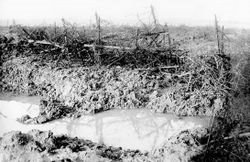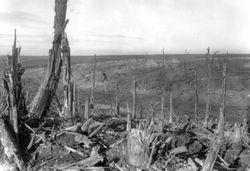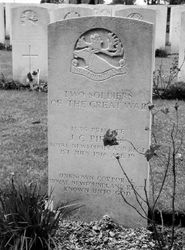The most brutal of days
See just this Post & Comments / 0 Comments so far / Post a Comment / HomeJuly 1, 1916 by Rex Murphy, exerpted from the Globe and Mail.
 In my province, it has been an abiding irony since we joined the Confederation that the national birthday coincides with the bleakest day on the entire calendar of Newfoundland history.
In my province, it has been an abiding irony since we joined the Confederation that the national birthday coincides with the bleakest day on the entire calendar of Newfoundland history.That's a brutal claim to make. Newfoundland history is streaked with calamity and loss of life. Those who have any familiarity with the long, sad course of the contentious seal hunt are aware that its pursuit has been scarred all too frequently with appalling catastrophes. Indeed, it was on the very eve of the First World War that 78 sealers from the SS Newfoundland were caught away from their ship in a savage storm on the northeast coast and died a gruesome death.
Outport existence and fishing on the wild waters of the North Atlantic were always a wedding with danger and peril. How many, over the generations, went out in the morning not to return at end of day it is probably impossible to tell. It is enough merely to note that Newfoundlanders are not unacquainted with grief.
 Modern times are no different. The boon of offshore oil had a terrible inauguration with the Ocean Ranger disaster. On Feb. 15, 24 years ago, under the assault of 100-mile-an-hour winds and massive waves, the Ocean Ranger went down, and all her 84-member crew with her. I remember that day. Newfoundland is a small place. It blackened the entire province, as everyone seemed to have some connection — family, neighbour, friend — with one of the lost.
Modern times are no different. The boon of offshore oil had a terrible inauguration with the Ocean Ranger disaster. On Feb. 15, 24 years ago, under the assault of 100-mile-an-hour winds and massive waves, the Ocean Ranger went down, and all her 84-member crew with her. I remember that day. Newfoundland is a small place. It blackened the entire province, as everyone seemed to have some connection — family, neighbour, friend — with one of the lost.Grief strikes hard in a concentrated space; it echoes longer in the common memory. For every rollicking ballad of the likes of We'll Rant and We'll Roar Like True Newfoundlanders, almost intoxicated with the delight Newfoundlanders take in the rough, wild place we call home, there is another pitched in a minor key.
There is an undernote of keening in all Newfoundland history.
The keening was never sharper than after the morning, 90 years ago today, when the 801 members of the Newfoundland Regiment left their trenches and went "over the top" toward the German lines at Beaumont Hamel. So many, and so young, they went to death or maiming. Of those 801, only 68 were present for roll call the next day. For the Newfoundland Regiment, for Newfoundlanders back home, it was, to summon up a biblical name, Aceldama, the field of blood.
If Newfoundland, in terms of population, is a small place now, it was an even smaller place then. The young men of Beaumont Hamel (we would surely call many of them boys today) had come from every corner of the country (as then it was). Not an outport nor a town but sent someone, not a family hardly but was to bear the terrible cross of a favourite they were never to see again.
They had gone with that mix of motives with which young men have always gone to war. Adventure beckoned some, escape from the too-familiar others, honest fealty to "King and Country," which probably seems a little outré today, likely spoke in some measure to all.
 But it surely ripped the heart of all of Newfoundland that in the very first minutes of the great Battle of the Somme (in less than half an hour, they knew doom was upon them), on a perfect summer day, that so many of her sons in that battalion, nearly all, were dead or mangled. The Newfoundland Regiment fell under a brutal hammer stroke of concentrated machine-gun fire, mortar and sniping. They were, for that time, alone on the field. The Essex Regiment, which was to have simultaneously advanced, in the confusions of that morning, had not.
But it surely ripped the heart of all of Newfoundland that in the very first minutes of the great Battle of the Somme (in less than half an hour, they knew doom was upon them), on a perfect summer day, that so many of her sons in that battalion, nearly all, were dead or mangled. The Newfoundland Regiment fell under a brutal hammer stroke of concentrated machine-gun fire, mortar and sniping. They were, for that time, alone on the field. The Essex Regiment, which was to have simultaneously advanced, in the confusions of that morning, had not.It was the most brutal day in Newfoundland history.
The regiment received the honorific of "Royal" from King George himself, the only such designation that was awarded during the war itself.
But for me, the most affecting memorial comes not from the ceremonial designation — the Royal Newfoundland Regiment — or even from the carefully tended battlefield, which today will host the first return of the regiment as a unit since that awful day 90 years ago, but from the words frequently cited of some of the wounded survivors of that terrible morning: "Is the Colonel pleased? Is the Colonel satisfied?"
There is a ferocious loyalty in those words. And a ferocious innocence as well.
Tags: Newfoundland, Beaumont Hamel.



